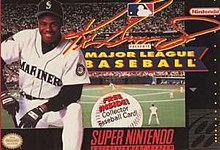Ken Griffey, Jr. Presents Major League Baseball
| Ken Griffey Jr. Presents Major League Baseball | |
|---|---|

Front cover
|
|
| Developer(s) | Software Creations |
| Publisher(s) | Nintendo |
| Platform(s) | SNES |
| Release |
|
| Genre(s) | Sports |
| Mode(s) | Single-player, multiplayer |
Ken Griffey Jr. Presents Major League Baseball is a Super NES baseball game that was released in 1994. The game has a Major League Baseball license but not a Major League Baseball Players Association license, meaning that the game has real stadiums and real teams, but not real players (except Ken Griffey Jr.). The fictitious players have the same statistics as their real-world counterparts, and the game comes with a name-changing feature that allows players to change the athletes' names. Nintendo released a portable version of the game in 1997 for the Game Boy with real players and stats from the 1996 season. The gameplay is similar to its predecessors, though it is sometimes sluggish due to hardware restrictions. The SNES version came with a promotional Griffey collector's card packed inside and was a major commercial success, with 1.2 million units sold.
Fictitious players in the game are themed with their teammates. Some of the themes include:
The only actual baseball player is Ken Griffey Jr. himself, although the New York Yankees have several player names that are references to past Yankee superstars. Griffey's name is the only one that cannot be changed.
At the end of every game, the game provides box scores and scoring summaries in newspaper format, providing a humorous newspaper headline on other goings-on in the world of Major League Baseball.
The game has several other features, including a home run derby in which players practice their power hitting against either Ken Griffey Jr. or against one of five fictitious power batters (for instance, Griffey's NL analogue is named "Nick Noheart").
The game features the voice of umpire Steve Palermo for called strikes, balls and outs and legendary broadcaster Jack Buck provides the play-by-play.
The game's other vocal soundbite, that of a batter turning to the umpire and screaming "Oh come on!" after a called strike three was sampled from a Jim Belushi line in the 1985 movie The Man With One Red Shoe.
...
Wikipedia
